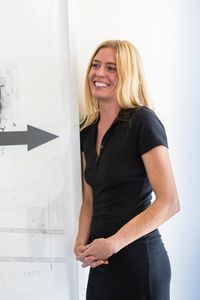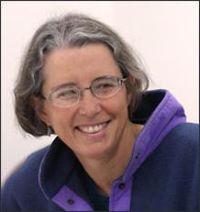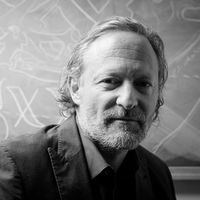Emergent Engineering Speakers: Difference between revisions
From Santa Fe Institute Events Wiki
No edit summary |
|||
| Line 23: | Line 23: | ||
<hr/> | <hr/> | ||
[[File: | [[File: Stephanie_forrest.jpg|thumb|200px|[https://www.santafe.edu/people/profile/stephanie-forrest '''Stephanie Forrest''']<br/>'''ASU and Santa Fe Institute''']] | ||
'''Stephanie Forrest''' is an American computer scientist and director of the Biodesign Center for Biocomputing, Security and Society at the Biodesign Institute at Arizona State University. She was previously Distinguished Professor of Computer Science at the University of New Mexico in Albuquerque. She is best known for her work in adaptive systems, including genetic algorithms, computational immunology, biological modeling, automated software repair, and computer security. | '''Stephanie Forrest''' is an American computer scientist and director of the Biodesign Center for Biocomputing, Security and Society at the Biodesign Institute at Arizona State University. She was previously Distinguished Professor of Computer Science at the University of New Mexico in Albuquerque. She is best known for her work in adaptive systems, including genetic algorithms, computational immunology, biological modeling, automated software repair, and computer security. | ||
<div style="clear: both;"></div> | <div style="clear: both;"></div> | ||
Revision as of 23:51, 14 June 2019
Please check back as speaker bios will be updated periodically.
Speakers Include:

NYU and Santa Fe Institute
Joshua Epstein is a professor at New York University's College of Public Health. His research focuses on modeling complex social, economic, and biological systems using agent-based computational models and nonlinear dynamic systems. Dr. Epstein is the Director of the Agent-Based Modeling Lab, which works with large-scale epidemic models and cognitively plausible agents in order to produce a transformative synthesis for global public health modeling through the generative social science approach.

Santa Fe Institute
Jessica Flack is a professor at SFI where she runs the Collective Computation Group. They work on fundamental problems in evolutionary theory concerning collective behavior, collective computation, and collective intelligence—at all levels of biological organization—from societies of cells to societies of individuals to machine-human hybrid societies. Her particular interests are in the role of collective computation/intelligence in the origin of space and time scales and in the emergence of robust structure and function in nature and society. She is fascinated with the idea that components in adaptive systems construct their macroscopic worlds through collective coarse-graining in evolutionary and/or learning time.

ASU and Santa Fe Institute
Stephanie Forrest is an American computer scientist and director of the Biodesign Center for Biocomputing, Security and Society at the Biodesign Institute at Arizona State University. She was previously Distinguished Professor of Computer Science at the University of New Mexico in Albuquerque. She is best known for her work in adaptive systems, including genetic algorithms, computational immunology, biological modeling, automated software repair, and computer security.

Santa Fe Institute
David Krakauer is the President and William H. Miller Professor of Complex Systems at Santa Fe Institute. His research explores the evolution of intelligence on earth. This includes studying the evolution of genetic, neural, linguistic, social and cultural mechanisms supporting memory and information processing, and exploring their shared properties. He served as the founding Director of the Wisconsin Institute for Discovery, the Co-Director of the Center for Complexity and Collective Computation, and Professor of mathematical genetics all at the University of Wisconsin, Madison. David has been a visiting fellow at the Genomics Frontiers Institute at the University of Pennsylvania, a Sage Fellow at the Sage Center for the Study of the Mind at the University of Santa Barbara, a long-term Fellow of the Institute for Advanced Study in Princeton, and visiting Professor of Evolution at Princeton University. In 2012 Dr. Krakauer was included in the Wired Magazine Smart List as one of 50 people "who will change the World.” In 2016 Krakauer was included in Entrepreneur Magazine’s visionary Leaders advancing global research and business.
